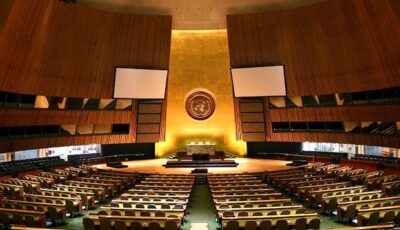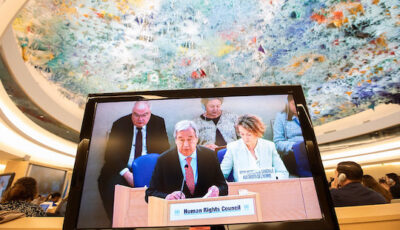At the heart of good governance is the need for governments to treat other nations with respect, with peace, and with a readiness for dialogue and global cooperation, says Jeffrey Sachs in the Lucis Trust bi-annual letter.
This forum is asking important questions about how governance should be carried out in the 21st century to meet the very complex needs of modern society and the complex needs of a world of 8 billion people.
I want to say at the outset that there is no magic formula. There is no single set of Institutions, there is no single model of good governance that one can apply to each place because every country has its political culture, its specific orientations and needs, its local and historical circumstances that will shape the political institutions. But I do think it is fair to say that political institutions should meet certain basic tasks and certain basic responsibilities. And I would mention six very briefly.
First, a government should be based on a consistent orientation to the common good. Now this may seem obvious, but many governments are not oriented towards the common good, they’re oriented towards very narrow interests, maybe the interests of the elite, the interests of the rich, the interests of a part of society. But we need government to be oriented towards the common good of all of society.
Second, government should honour procedural justice. That means the rule of law. That means treating people systematically in judicial or legislative methods so that there is not abuse of power, that there is not individual discrimination and abuses that undermine the quality of our political community.
The third is that governments should have the capacity to achieve not only procedural justice but substantive justice, and in part that means achieving the economic conditions for people to meet their needs across society. To achieve the economic needs of society, government needs capacity, professionalism, the ability to plan, the ability to understand the changing needs whether it is because of environmental challenges or technological changes. So government capacity, expertise, planning directed towards the common good, is a core part of decent and necessary governance.
A fourth part of good governance, in my view, is fostering the virtues of civic participation and the individual virtues of the population. And by that, I mean government through public education and through the good behaviour of leaders should help to foster the good behaviour of citizens – law abidingness, generosity, altruism, mutual respect. All of these individual virtues, virtues of moderation, virtues of care about others should be fostered communally and government by example, by good public education, by carrying out policies of procedural and substantive justice can help to imbue virtues in society.
A fifth point that I would emphasize, especially in our diverse societies, is that good governments should respect and treat minorities within society with decency, with respect, with procedural justice, with law abidingness.
We have diverse communities and in diverse communities there are risks of discrimination, of intergroup conflict and hate, and it is crucial for governments, especially in multi-ethnic societies, to ensure that minority groups are treated with decency, with human respect. And I think that all of our societies need to work hard to strive for that.
The sixth point of good governance that I would emphasize is the need for governments to treat other nations with respect, with peace, with a readiness for dialogue and with a readiness for global cooperation.
We are especially right now at a time of tremendous geopolitical stress, very dangerous stress, in fact a hot war of course in Ukraine and dangers of more conflict in Asia and other parts of the world. And we need especially the major countries to be speaking with each other, to be cooperating with each other, to be operating according to standards of the international diplomacy, to be honouring the UN Charter, to be honouring the Universal Declaration of Human Rights, in other words for our different nations to treat each other collegially, respectfully, diplomatically and especially peacefully.
So, this I believe is the most important way to think about governance is, what are the conditions that good governance calls for? What are the behaviours that governments should respect? To achieve these objectives can occur with very different kinds of institutions and even the same kinds of institutions that sometimes can function well and at other times can function poorly. In American society our political institutions are not functioning well right now, in part because big money in campaign finance and lobbying corrupted a lot of our political system. So, institutions need to be renovated, they need to operate properly, they need to fight against the corruption of the political systems themselves.
A final word that I would like to add about this diversity of political institutions but the shared need to focus on the common interests, the common good, and in a way which promotes virtue, and which promotes human dignity and promotes cooperation among nations is that we should be drawing on our ancient wisdom to help us to achieve this kind of virtuous politics.
In the western tradition, the first and I think the greatest book of political science ever written in the West was by Aristotle, The Politics, which goes back 2,300 years and the companion volume of the politics was the Nicomachean Ethics. So, ethics and politics were put together in the western tradition.
In the Asian tradition Confucius taught about proper behaviour of individuals – as Aristotle did – virtuous behaviour and also the virtuous behaviour of states; so a similar kind of tradition. I think it is extremely important for us to tap these deep traditions – Aristotle in the west, Confucianism and other traditions, so that we can find our grounding and achieve mutual understanding and mutual respect.
In the end, I think the role of science is to bring light into the world – the light of our understanding of what we are.
Good governance can come in many ways, it should be based on the deep wisdom traditions, a history of statecraft, national cultures, but especially it should aim for the common good and it should aim for international cooperation.
This talk was transcribed from an address to the China Democracy Forum. A video recording is available online: https://bit.ly/4drkdr5
Original source: Lucis Trust
Image credit: Tri Hita Karana, Wikimedia Commons






